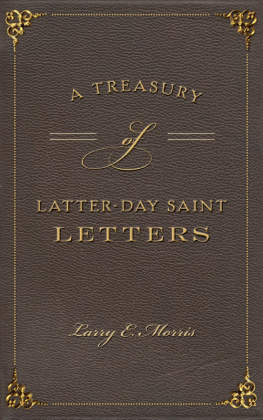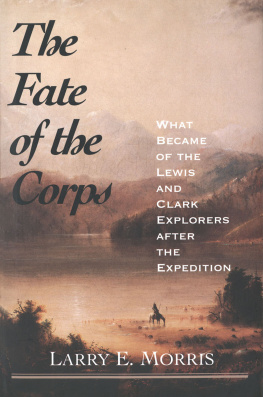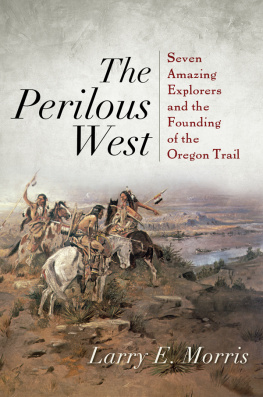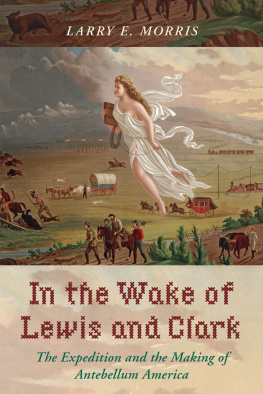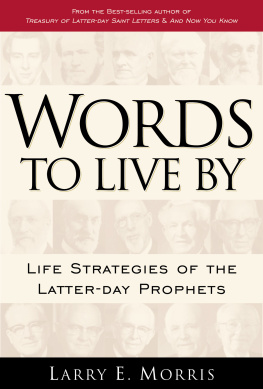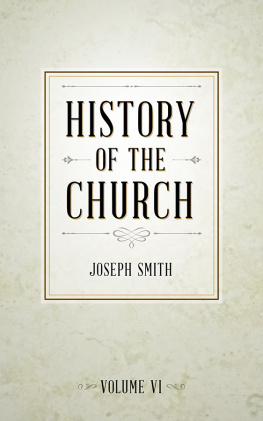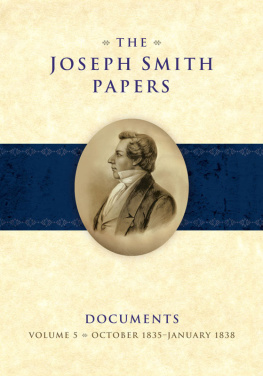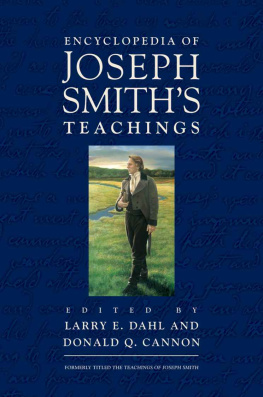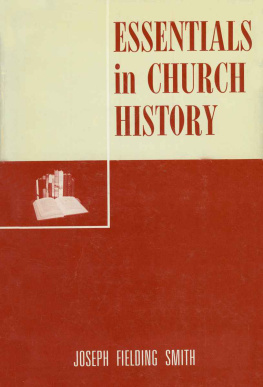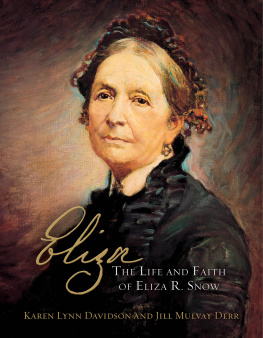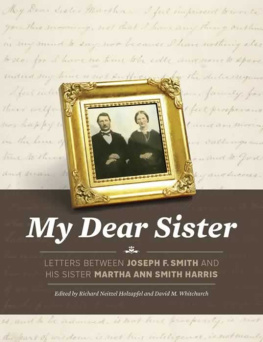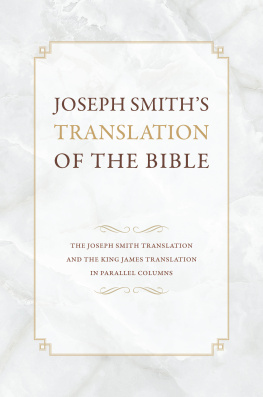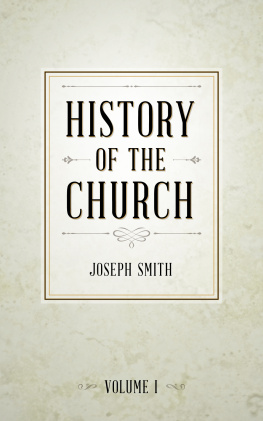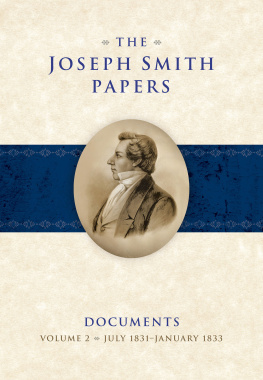


Published by The History Press
Charleston, SC
www.historypress.net
Copyright 2017 by Larry E. Morris
All rights reserved
Cover portrait images: Reed Smoot, former member of the United States Senate from Utah. George Grantham Bain Collection, Library of Congress; Joseph Fielding Smith. Photo by Charles Roscoe Savage.
First published 2017
e-book edition 2017
An earlier version of this title was published by Deseret Book Company in 2001.
ISBN 978.1.43966.309.7
Library of Congress Control Number: 2017945022
print edition ISBN 978.1.62585.899.3
Notice: The information in this book is true and complete to the best of our knowledge. It is offered without guarantee on the part of the author or The History Press. The author and The History Press disclaim all liability in connection with the use of this book.
All rights reserved. No part of this book may be reproduced or transmitted in any form whatsoever without prior written permission from the publisher except in the case of brief quotations embodied in critical articles and reviews.
For Mom and Dad.
CONTENTS
PART I
HUSBANDS AND WIVES
I HAVE VISITED A GROVE ALMOST EVERY DAY
Joseph Smith to Emma Hale Smith, June 6, 1832
In May 1832, after visiting the Saints in Independence, Missouri, Joseph Smith, Sidney Rigdon and Newel K. Whitney began their return journey to Kirtland, Ohio, traveling by stagecoach. As they approached New Albany, Indiana, the horses bolted. Joseph leaped from the runaway stage to safety, but Newel caught his foot in the wheel and broke his leg in several places. Sidney proceeded on to Ohio, but Joseph stayed with his injured companion until Newel was able to travel. During the four-week period during which he cared for Newel, Joseph, twenty-six, wrote the following letter to his wife, Emma, twenty-seven, unaware that she was being shuffled from one residence to another.
June 6th, Greenville, Floyd County, Indiana, 1832
Dear Wife,
I would inform you that Brother Martin [Harris] has arrived here and brought the pleasing news that our families were well when he left there, which greatly cheered out hearts and revived our spirits. We thank our Heavenly Father for his goodness unto us and all of you.
Martin arrived on Saturday the same week he left Chagrin [Ohio] having a prosperous time. We are all in good health. Brother Whitneys leg is gaining, and he thinks he shall be able to perform his journey so as to get home about the 20th. My situation is a very unpleasant one although I will endeavor to be contented, the Lord assisting me.
I have visited a grove which is just back of the town almost every day, where I can be secluded from the eyes of any mortal and there give vent to all the feelings of my heart in meditation and prayer. I have called to mind all the past moments of my life and am left to mourn and shed tears of sorrow for my folly in suffering the adversary of my soul to have so much power over me as he has had in times past. But God is merciful and has forgiven my sins, and I rejoice that he sendeth forth the comforter unto as many as believe and humbleth themselves before him.
I was grieved to hear that Hyrum [Smith] has lost his little child. [Mary Smith, the three-year-old daughter of Hyrum and Jerusha Barden Smith, had died a week earlier, on May 29, 1832, in Kirtland.] I think we can in some degree sympathize with him, but we all must be reconciled to our lots and say the will of the Lord be done. Sister [Elizabeth Ann] Whitney wrote a letter to her husband [Newel] which was very cheering, and being unwell at that time and filled with much anxiety, it would have been very consoling to me to have received a few lines from you, but as you did not take the trouble, I will try to be contented with my lot, knowing that God is my friend. In him I shall find comfort. I have given my life into his hands. I am prepared to go at his call. I desire to be with Christ. I count not my life dear to me, only to do his will.
I am not pleased to hear that William McLellin has come back [from his mission] and disobeyed the voice of him who is altogether lovely for a woman [Emeline Miller, whom McLellin had married]. I am astonished at Sister Emeline, yet I cannot believe she is not a worthy sister. I hope she will find him true and kind to her but have no reason to expect it. His conduct merits the disapprobation of every true follower of Christ. But this is a painful subject, I hope you will excuse my warmth of feeling in mentioning this subject and also my inability in conveying my ideas in writing.
I am happy to find that you are still in the faith of Christ and at Father Smiths. I hope you will comfort Father and Mother in their trials and Hyrum and Jerusha and the rest of the family. Tell Sophronia I remember her and Calvin in my prayers. My respects to the rest. I should like to see little Juliaand once more take her on my knee and converse with you on all the subjects which concerns us, things I cannot, is not prudent for me to write. I omit all the important things which, could I see you, I could make you acquainted with.
Tell Brother [Frederick G.] Williams that I and Brother Whitney will arrange the business of that farm when we come. Give my respects to all the Brethren, Br. Whitneys familytell them he is cheerful and patient and a true brother to me. I subscribe myself your husband. The Lord bless you. Peace be with you, so farewell until I return.
Joseph Smith Jr.
(Martin [Harris] will come with us.)
Although Newel had been bedridden for an entire month, Joseph soon prophesied that if they left the next day they would promptly find a ferry to take them across the Ohio River and then a wagon to take them to a landing. These events unfolded as Joseph said, and they were soon traveling up the Ohio toward Kirtland.
Joseph and Emma moved into three rooms above the Whitney store, and Emma began taking in boarders, her chief means of income for the next four decades. Early in the fall, Joseph and Newel again departed, this time for New York City.
WE SHALL BE DELIVERED FROM EVERY SNARE
Emma Hale Smith to Joseph Smith, April 25, 1837
During the mid-1830s, the Saints in Kirtland, Ohio, were caught up in the spirit of the times and incurred heavy debts in their efforts to build personal as well as community economic strength.But the Saints, like other western settlers, had little liquid capital, and their business enterprises were begun on credit. Late in 1836, Church leaders organized the Kirtland Safety Society Bank and applied for a charter. When the application was denied (the fate of virtually all charter requests in Ohio that year), the Church formed a joint-stock company called the Kirtland Safety Society Anti-Banking Company and began issuing currency. The Kirtland economy boomed and then quickly collapsed, a common occurrence in the nationwide Panic of 1837.
As the value of the bank notes rapidly decreased, disillusioned investors criticized Joseph and some threatened him physically. Emma, thirty-two, wrote the following letter not long after Joseph, thirty-one, went into hiding.
Next page
